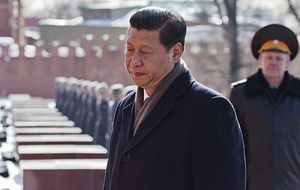In the two years since he was named general secretary of the Chinese Communist Party, Xi Jinping has moved swiftly to consolidate his personal grip on political power. Xi has established “leading small groups,” which he chairs, to handle the most pressing domestic and foreign policy problems. Similarly, he has used speeches and skillfully orchestrated appearances to make himself the public face of the regime and its unquestioned leader. At his direction,the Party-State apparatus has launched a series of well-publicized corruption investigations targeting high-ranking civilian and military officials.
By most accounts, Xi now exerts greater control over the Chinese system than any leader since Deng Xiaoping. A recent analysis in the New York Times quotes an unnamed Chinese academic as describing Xi as the “emperor,” while calling his colleagues on the Politburo Standing Committee merely “six assistants.” The notion that China is governed by a true “collective leadership” is now little more than a polite fiction.
Despite this appearance of solidity, there are some indications that the system may not be as stable as it seems. Since shortly before Xi’s elevation to the top leadership post there have been periodic rumors of coup attempts and assassination plots against him. As recently as August of this year, Radio Free Asia, a private news service that receives some of its funding from the U.S. government, carried a story under the headline “Some Kind of Coup May Have Taken Place in China.” The story purported to describe unusual troop movements, secret meetings, and enhanced security measures in some Chinese cities. Meanwhile, at around the same time, a Hong Kong magazine published an account claiming that Xi had already survived six assassination attempts. Xi himself may have lent credence to these rumors in a speech to top party officials earlier in the summer in which he reportedly said that he was prepared to but aside considerations of “life, death, and reputation” in order to pursue his campaign against corruption.
Reports of coups and plots may be little more than groundless gossip, or even disinformation circulated by opponents of Xi or the entire CCP regime. But the existence and persistence of these rumors points to a deeper truth: China is now caught up in a high-stakes political drama unlike anything the nation has seen since the aftermath of the Tienanmen Square incident in 1989, and perhaps even the final spasms of the Cultural Revolution. Whether his motives are genuinely to stamp out corruption, cynically crush potential rivals or, as seems most likely, some combination of the two, Xi is targeting some extremely powerful figures in the military, the security services, and the upper echelons of the Communist Party. Not only the livelihoods but also the freedom and indeed the lives of these people and their families are now at stake. What is remarkable is not that there are signs of opposition and resistance but rather that, at least to date, they have been so muted.
It is too early to say how this drama will play out. Xi may succeed in neutralizing his opponents or, as he suggested in his June speech, “the armies of corruption and anti-corruption” may become locked in “stalemate.” But sudden, unexpected and potentially violent developments cannot be ruled out. The rules that have governed high-level political combat in China for over thirty years no longer seem to apply. The possible implications of this for the nation’s internal stability and its external policies are topics that I will explore in subsequent columns.
[Ed. Note: We are pleased to announce that Aaron L. Friedberg will be a regular contributor to Flashpoints here on The Diplomat. Prof. Friedberg is a professor of public and international affairs at Princeton University. His most recent book is Beyond Air-Sea Battle: The Debate Over U.S. Military Strategy in Asia.]

































